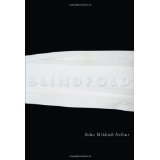Poetry
Blindfold
Montreal: McGill-Queen’s University Press, 2011.
PS8551 .S36 B55 2011
Publisher’s Synopsis (from its website)
Blinded by a grenade in Lebanon as a teenager, poet John Asfour came to Canada armed with James Joyce’s words, “For the eyes, they bring us nothing. I have a hundred worlds to create and I am only losing one of them.” Blindfold investigates the ways in which disability influences our lives and is magnified in our minds. In a series of thematically linked poems, Asfour draws the metaphor of the blindfold across the eyes of sighted citizens who are impaired by estrangement, emotional complexity, and social pressures.
A sense of exile and belonging dominates the poems, following the journey of a blind man whose life in his new land has been hampered by prejudice and barriers to communication. Exposing the rich and surprising possibilities of a life that has undergone a frightening transformation, Blindfold relates feelings of loss, displacement, and disorientation experienced not only by the disabled but by everyone who finds themselves separated from the norm.
Poetry
Fields of My Blood
Montreal: Empyreal, 1997.
Poetry
Land of Flowers and Guns
Montreal: DC Books, 1981.
Poetry
Nisan: A Book of Poetry
Fredericton, N.B.: Fiddlehead Poetry Books, 1976.
Poetry
One Fish From the Rooftop: Poems
Dunvegan, Ont.: Cormorant Books, 1992.
Publisher’s Synopsis
The small village of Aitaneat in Lebanon grows for the reader through evocative detail and memory, counterpointed with St. Henri in Montreal and the more ambiguous locations of searching and loss. These poems are intensely lyrical and full of sentiment–the focus of memory–juxtaposing life in the new world of Montreal, with its Burger Bliss restaurants and St. Henri poor, with the rich and painful life of Aitaneat, ravaged by war but rich in history and family and local legend.
Links
QWF Literary Database of Quebec English-language Authors entry
Publisher McGill-Queen’s University Press
